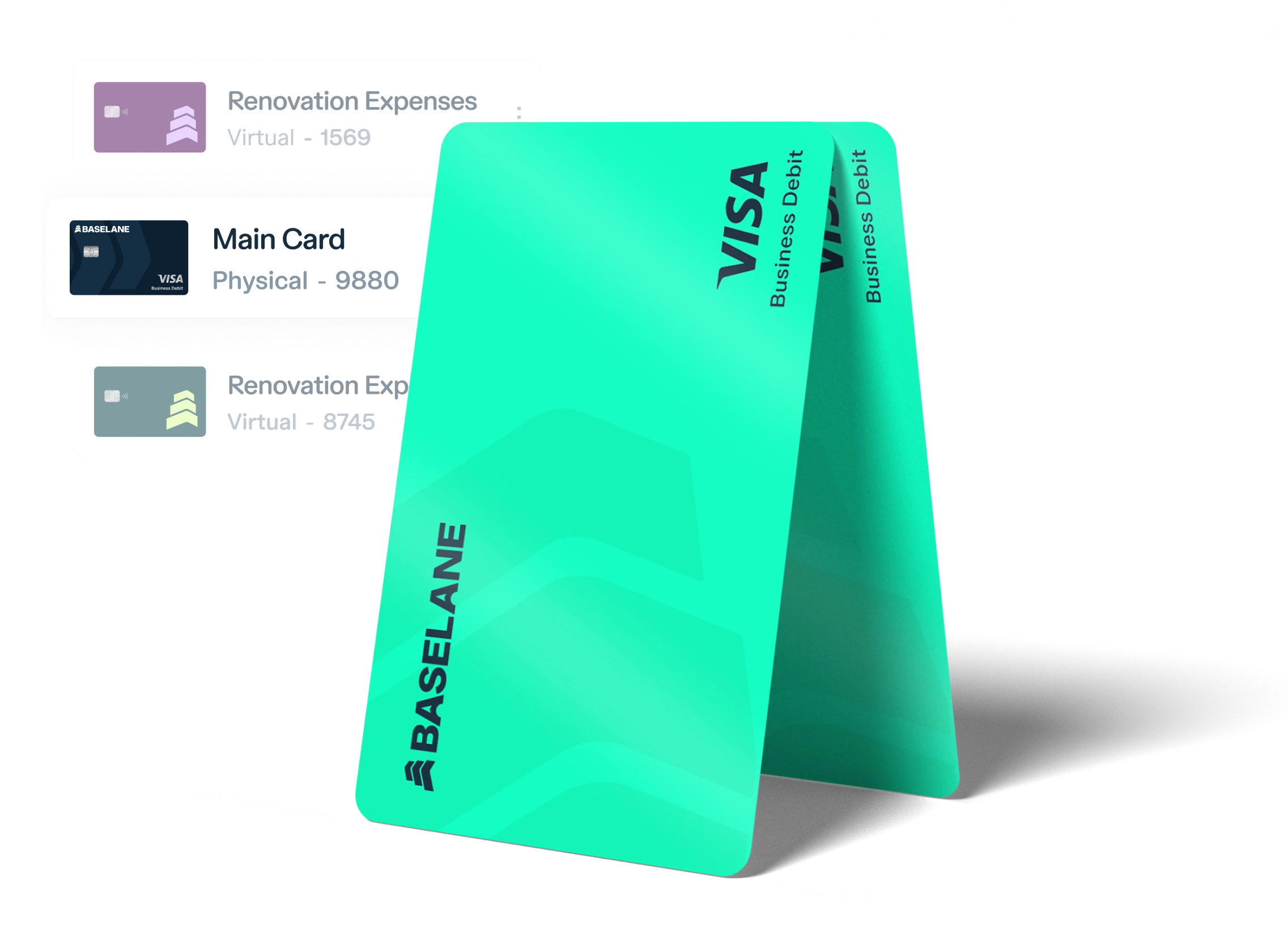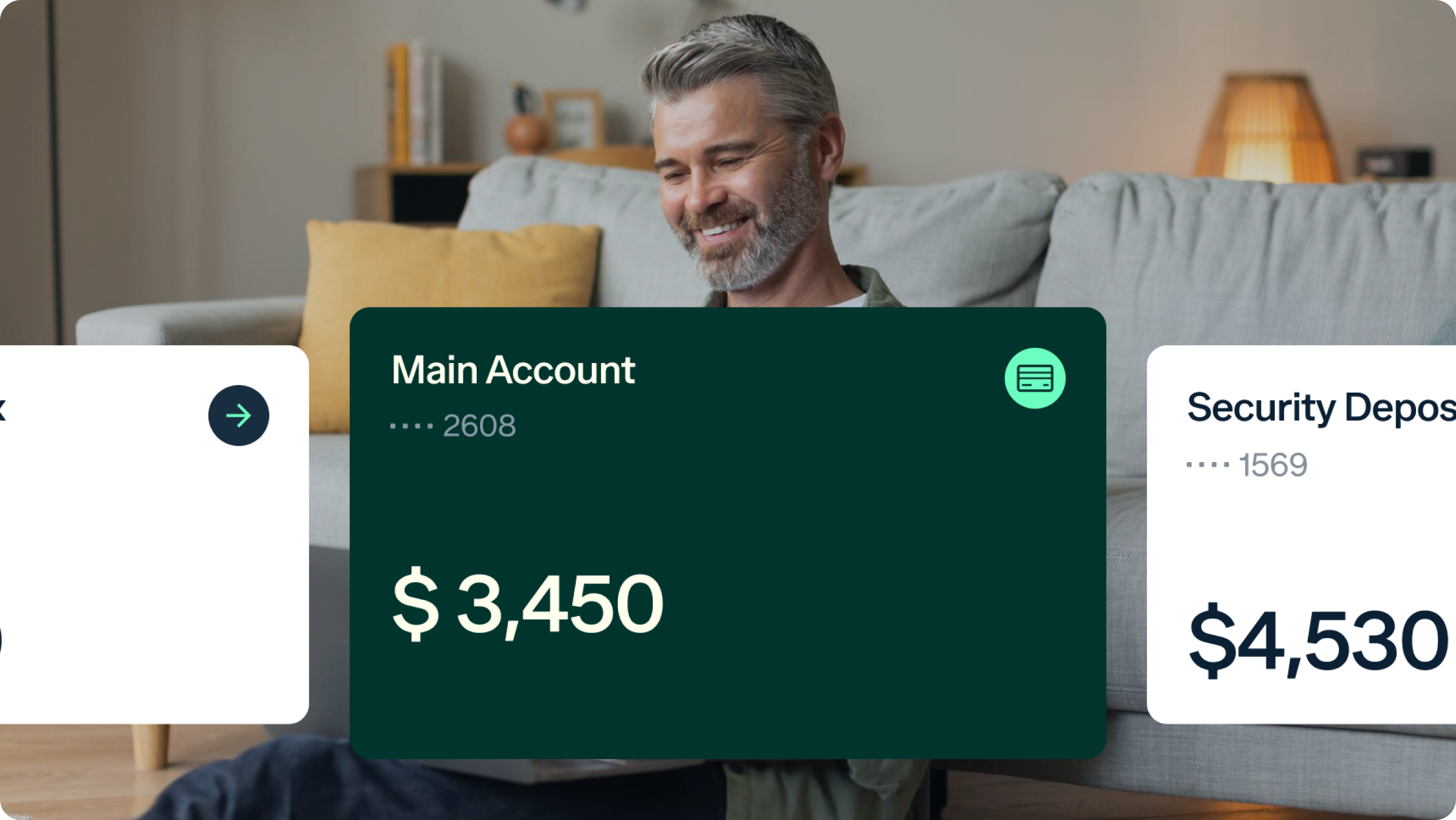Managing rental properties means handling a steady flow of income and expenses, rent payments, bills, taxes, repairs, and reserves. Without a clear system, it’s easy to lose track. Knowing how to separate money in bank account setups is key to staying organized, compliant, and ready for tax season.
That’s where a structured banking setup comes in. Using separate bank accounts gives you financial clarity, protects your assets, and reduces administrative stress. It also makes tracking profits, reporting income, and making informed decisions much easier.
In this guide, we’ll cover why separating personal and rental finances matters, what sole proprietorship bank accounts you need, and the best way to set up HOA bank accounts for real estate investing.
Key takeaways
- Keeping personal and rental property finances separate is crucial for legal protection and tax compliance. Commingling funds risks liability exposure and complicates bookkeeping.
- You should establish three core accounts: Operating, security deposit, and homeowners association reserve fund. This structure simplifies income tracking, compliance, and financial planning.
- Security deposits must be held in a separate, often interest-bearing escrow or savings account per state laws. Mishandling deposits can lead to legal disputes and financial penalties.
- Set up automated transfers for reserves and use software to categorize transactions. This minimizes errors and keeps your rental finances organized and audit-ready.
- Look for banks offering low fees, strong digital tools, and rent collection integrations to support managing rental property finances more effectively.
Why landlords must separate personal and rental finances
One of the most important steps for you is to separate personal and rental property finances. This isn’t just about staying organized, it’s essential for legal protection and tax compliance.
When you mix personal and business funds (a practice called commingling), you risk losing the liability protection of an LLC or corporation. In legal terms, a court could “pierce the corporate veil,” putting your assets at risk in a lawsuit.
Setting up a dedicated AI bank account for rentals makes financial tracking far easier. It ensures every dollar of rental income and expense is documented, which simplifies bookkeeping and maximizes your tax deductions.
A proper setup bank account strategy keeps your finances clean, protects your assets, and saves you time during tax season, all while giving you better control over your rental property business.
Your essential rental property bank accounts
To manage your rental property finances effectively, you need more than just one bank account. A smart setup helps you stay organized, compliant, and prepared for anything. The way your bank accounts are structured directly impacts how easily you can track income, expenses, and plan for the future.
Here are the three essential accounts you should have:
1. Operating account
This is the core reserve account for your rental business.
Purpose: Collect rent, pay property expenses, like the mortgage, insurance, repairs, utilities, and property management fees.
What to look for: Choose a bank with no or low fees, easy deposit options, strong online access, and integration with property management software, including rental property software for small landlords or multifamily property management software.
2. Security deposit account
Handling deposits legally and transparently is essential.
Purpose: Hold tenant security deposits until the lease ends. These funds belong to the tenant unless applied to damages or unpaid rent.
Why it must be separate: Many states require security deposits to be stored in a dedicated account, sometimes interest-bearing. Putting rent in escrow or a similar setup helps you stay compliant and avoid legal issues. Baselane a digital banking solution offers unlimited security deposit accounts to simplify this process.
3. Reserve fund account
Planning protects your business from surprises.
Purpose: Set aside money for large repairs, capital improvements, and rental vacancies.
Why it matters: This buffer helps you avoid personal debt when big expenses come up.
How much to save: A common rule is 10–20% of monthly rent or $5,000–$10,000 per unit, depending on the size and age of your property.
Using separate operating reserve accounts for operating, security deposits, and reserves gives you financial clarity, and when paired with tools like advanced property management platforms, the entire process becomes easier.
Some landlords also create an escrow cushion within the reserve account to maintain liquidity for time-sensitive expenses like legal fees, urgent repairs, or HOA penalties.
Whether you’re using the best landlord app or exploring new property management software, having a proper banking setup keeps your finances clean, compliant, and ready to scale.
Should you open an account for each property?
If you have multiple properties, a common question is whether to open a separate real estate bank account for each one.
Pros: Opening a dedicated bank account per property provides the most granular level of tracking. You can see the exact income and expenses for each property separately, making it easy to analyze performance property-by-property.
Cons: Managing numerous accounts can become cumbersome. If you have many properties, this could mean juggling a dozen or more accounts, increasing administrative complexity.
When it makes sense: Having individual accounts might be beneficial if each property is held under a separate legal entity (e.g., an LLC per property) or if you manage a very complex portfolio and require detailed, isolated financial data for each asset. For many landlords, starting with one set of operating, security deposit, and reserve accounts, and then using bookkeeping software to track income and expenses per property within that structure, offers a good balance of clarity and manageability.
Baselane offers services specifically for landlords, so you can manage rent collection, expenses, and property finances in one place. It also lets you open unlimited accounts, one for each property if needed, and automatically tags transactions by property and Schedule E category, so you can stay organized without stressing about keeping track of it all.
Banking Built for Real Estate Businesses
Open unlimited accounts for properties and security deposits with no monthly fees.
Setting up and managing your rental property bank accounts: A step-by-step guide
Creating a structured bank account for landlords doesn’t have to be complicated. With the right setup, you’ll simplify money management, stay compliant, and improve financial visibility.
Step 1: Choose your bank
Look for banks that understand your needs, have low fees, strong online tools, and support for managing multiple accounts or sub-accounts. Some specialize in real estate banking or offer integrations with property management software.
Step 2: Open the necessary accounts
You’ll need three core accounts:
- An operating account for rent collection and expenses
- A security deposit account that complies with state law
- A reserve fund account for emergencies and capital expenses
If you’re setting up multiple accounts for landlords, be consistent in naming conventions (e.g., “Elm St. Operating” or “Unit 2 Reserve”) so you can easily track transactions and avoid mix-ups.
You might wonder multiple bank accounts—good or bad? For landlords, they’re often essential. When each account has a clear purpose—rent collection, security deposits, or reserves—your finances stay clean and compliant.
If you’re wondering how to open an escrow account for rent, check if this is an option or requirement for deposits in your state.
Step 3: Fund your accounts
Deposit initial capital into your operating account to cover initial expenses or build a small buffer. Start funding your reserve fund account with a transfer from your operating account or personal funds (clearly documented as owner’s equity).
Step 4: Route all rental income to the operating account
Instruct tenants to pay rent directly into your operating account. Using online rent collection tools that deposit directly into this account simplifies this step significantly.
Step 5: Pay property expenses from designated operating accounts
Use one operating account per property or entity, or a central account with clear tracking, whatever fits your structure best. The key is to keep personal and business finances separate for compliance and easier tax prep. With Baselane, you can set up multiple accounts, automate bill payments, and categorize expenses by property and Schedule E to stay organized effortlessly.
Step 6: Set up automated transfers
Automate transfers to your reserve fund (e.g., monthly or after rent collection). This is one of the smartest ways to manage cash flow. You can also set up transfers to a tax savings account.
Step 7: Implement a system for tracking transactions
While many banking platforms lack built-in tools for tracking and categorizing rental income and expenses, this is where Baselane stands out. It automatically tags transactions by property and Schedule E category, so you don’t have to rely on manual entry or spreadsheets. With Baselane’s virtual account structure and automation, staying organized takes significantly less time and effort.
Step 8: Reconcile accounts monthly
Regular reconciliation ensures your bank statements match your transaction records, helping catch errors, prevent fraud, and keep your books accurate. With Baselane, this process is automated. Your transactions are synced and categorized in real time, so you can review and verify everything without manual work.
Integrating banking with financial tracking tools
While separate accounts provide structure, integrating your banking with financial tracking tools takes efficiency to the next level. Some property management software or accounting platforms can connect directly to your bank accounts, automatically importing transactions.
This eliminates manual data entry, automates categorization, and generates critical financial reports like cash flow statements and Schedule E tax reports with minimal effort. This seamless connection is central to effective cash flow tracking, separately for each property if your software allows it.
If you’re managing multiple properties or users, a bank account with multiple cards helps you assign roles, limit spending, and maintain clean, trackable expenses.
Avoiding common pitfalls and ensuring compliance
Maintaining your structured banking system requires vigilance.
- Never commingle funds: This cannot be stressed enough. Consistently keep personal and rental funds separate.
- Stay up to date on security deposit laws. Understand how to determine security deposit amounts based on your state and how much security deposit a landlord can charge. Some states also require you to pay escrow interest rates on held deposits, so always review local rules to avoid penalties.
- Maintain clear records for tax time: Your organized bank accounts and transaction tracking system will provide the necessary documentation for tax filing, making it much smoother to claim all eligible deductions. Using category tags or checking account dividers within your banking or accounting system is key. Learn how to avoid bank fees that can eat into your profits.
Having multiple accounts is essentially how to divide money in a bank account based on purpose. Think of them as virtual bank account dividers, each serving a specific function within your rental business’s financial ecosystem. This approach simplifies how to organize money in a bank account for your real estate investments and is the best way to set up bank accounts for clarity and control. Learning how to organize your bank accounts effectively is a key step in scaling your portfolio.
Easily separate and automate rental property finances with Baselane
Knowing how to separate money in bank account setups is essential for legal compliance, tax efficiency, and easier financial management. Using dedicated operating, reserve, and security deposit accounts helps you stay organized, meet deposit laws, and build a strong financial foundation.
The benefits of digital banking, from automation to real-time tracking, make managing rental income simple. And if you host short-term rentals, choosing the best bank account for Airbnb ensures your funds stay separated by property.
Baselane offers an all-in-one financial platform built for landlords, including landlord-friendly accounts, automated rent collection, built-in bookkeeping, and security deposit tracking. Baselane offers high-yield savings, virtual cards, and automated expense tracking, making it easy to separate finances by property and stay organized year-round.
Open your free Baselane account today and simplify your rental property finances.
FAQs
You should have at least three accounts: an operating account, a security deposit account, and a reserve fund account. The way that your bank account is set up impacts how well you track rental income and expenses.
Separating accounts protects your assets, simplifies taxes, and is a key part of how to manage a bank account as a landlord.
Always use a separate, dedicated escrow or security deposit account that complies with local laws. This ensures legal protection and proper fund handling.
Yes, if the properties are under the same entity, just use software to track income and expenses per property. It’s one of the top three ideas on how best to manage his account structure.
Look for banks offering no or low fees, easy online access, mobile check deposit, simple ways to receive payments (like online rent collection integration), features for categorizing transactions, and potentially FDIC insurance up to high limits.








